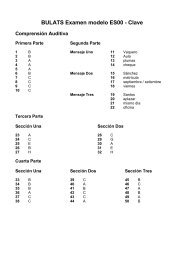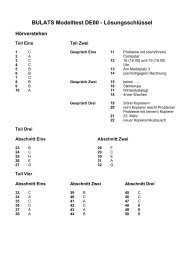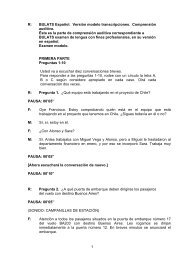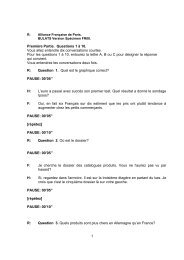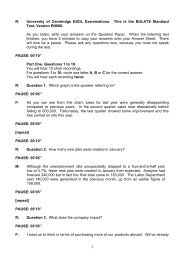BULATS tapescript EN000A
BULATS tapescript EN000A
BULATS tapescript EN000A
You also want an ePaper? Increase the reach of your titles
YUMPU automatically turns print PDFs into web optimized ePapers that Google loves.
R: Part Four. Section Three. Questions 45 to 50.<br />
You will hear an interview with Ian Cole, a business consultant, about customer<br />
surveys.<br />
For questions 45 to 50, circle one letter, A, B or C for the correct answer.<br />
You will hear the interview twice.<br />
You have 20 seconds to read the questions.<br />
PAUSE: 00’20”<br />
R: Now you will hear the interview.<br />
PAUSE: 00’02”<br />
F: In the studio today I have marketing consultant Ian Cole, who’s an expert on<br />
measuring customer satisfaction. What’s your opinion of the value of this activity, Ian?<br />
M: The term ‘customer satisfaction’ has long been in use, and analysts claim it’s a major<br />
determinant of success in business. Companies spend time and money on research,<br />
trying to measure how pleased their customers are. Theoretically, this is vitally<br />
important information. In my experience, however, the outcomes of a survey don’t<br />
reveal the true picture.<br />
F: So is it that companies don’t necessarily benefit from their research?<br />
M: I believe so. Companies incorrectly think that ‘satisfaction’ means ‘loyalty’. It’s often<br />
the case that customers are satisfied, but if they believe they’d be equally, or better<br />
satisfied with any other provider, they’ll switch. To get an accurate measurement of<br />
loyalty, a new type of questionnaire with a different scale is required. In this new scale,<br />
the middle answer is: ‘Fine. I have no complaints: but I didn’t feel the product or<br />
service was anything special.’ This is likely what most of your customers actually think<br />
about you.<br />
F: OK, so how easy is it to get an accurate or precise picture of customers?<br />
M: Not that easy. Be careful of how you read results in tough times. Recent studies of the<br />
fast-food industry show that when there’s a recession, consumers are willing to reduce<br />
their own ‘total satisfaction’ in favour of buying at ‘purely the lowest price’. Though, if<br />
you want to differentiate your customers in a more positive way, a rating could be<br />
‘Better than I could expect from another provider.’ Here, long-term loyalty begins to<br />
assert itself.<br />
F: And what about the customers themselves? What should they take account of?<br />
M: Sometimes they’re lazy. For example, a customer goes to have their car repaired, and<br />
as they leave the dealership, the salesman gives them a feedback sheet. He says that<br />
company’s goal is to have a perfect score, and asks if there’s anything he can do to<br />
make that happen. While the guideline is disguised as an offer of service, in fact all he<br />
really cares about is getting a good score. The customer isn’t doing the company any<br />
favours because it never learns the truth – that the customer really didn’t think they<br />
were anything special.<br />
16




